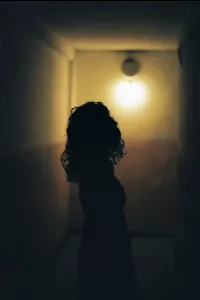Foto Femme United has been talking a lot about sexism in the photography industry since its creation, bringing to the surface discrepancies in representation, occupation and wages, while encouraging women in the field and promoting their work. But, while we know what causes and what is caused by gender-based discrimination, we tend to focus less on what sexism really looks like. It is not only about getting the job: the fact that men and women are often working in the same space means nothing. It is rather about the interaction between genders. Most female-identifying professionals, in fact, would agree that sharing the workplace with men in too many cases translates into paternalistic efforts at teaching, explaining or imparting knowledge on women photographers, alongside miserable comments that have nothing to do with their production and that women hear routinely. “Oh, that’s such a big lens for a little girl”.
I spoke with K., who works in the film industry, about this and we had a chat about her own experience in her company. She is the only woman in her team and is often treated like the assistant despite her credentials.
FFU: What does it mean to you to be a female-identifying film industry worker?
K: To be a female identifying film photographer to me means that I can use my voice to perpetuate real women to the world. I don’t shoot models, my ‘models’ are either my friends or people I meet in the street. I want my photos to be honest, raw representations of moments in time. I think there is a clear imbalance in screen industries of female voices, females in power and females being able to upskill. But I know great companies like Screen Skills exist in employing people solely on merit. They have a huge focus on employing women, POC, people from disadvantaged backgrounds etc.
.jpg?type=im&w=355&h=200&s=44cb137509d8948dbd739ecbda3a513c)
FFU: What does sexism look like in photography today? And do you have any story of gender-based discrimination that involves yourself specifically as a female?
K: In terms of my company, sexism is formed in many different ways, but the most obvious to me seems to be trust. I can say one thing and it be ignored but my male colleague can say the same thing or rephrase what I have said to answer a question, offer advice or complete a job task. I also notice across my team that my voice isn’t as important (despite experience or the fact that they hired me to do my job - this seems irrelevant at times). I do not see myself as a junior member of staff, I don’t think I should be junior and I am not anyone’s assistant. However, I often feel as though people are treating me as their personal assistant. I also experience condescending behaviour from my male colleagues. I am a strong female so want to nip this in the bud, but at times I feel like I can’t say anything as the automatic reaction is to accuse a woman of being on her period or having hormones.
That’s where we always end up, every single time: paternalism and gender stereotypes and belittling.
Actually, if we think more carefully about it, we would realize that the point is that the male-female debate in photography and film should not even exist: this is not a competition. Women are just as able as men. They know exactly what they are doing and do not need their counterpart to teach them how to do their own job. They understandably want to be recognized for their work and not their gender but, while we do not refer to male photographers as male, in an industry where women are less likely to be hired and more likely to be paid less than men and undervalued, it feels essential to champion their contribution – and gender.

.jpg?type=im&w=355&h=200&s=77f02e13bd79bd0051beb9e065bf45de)



